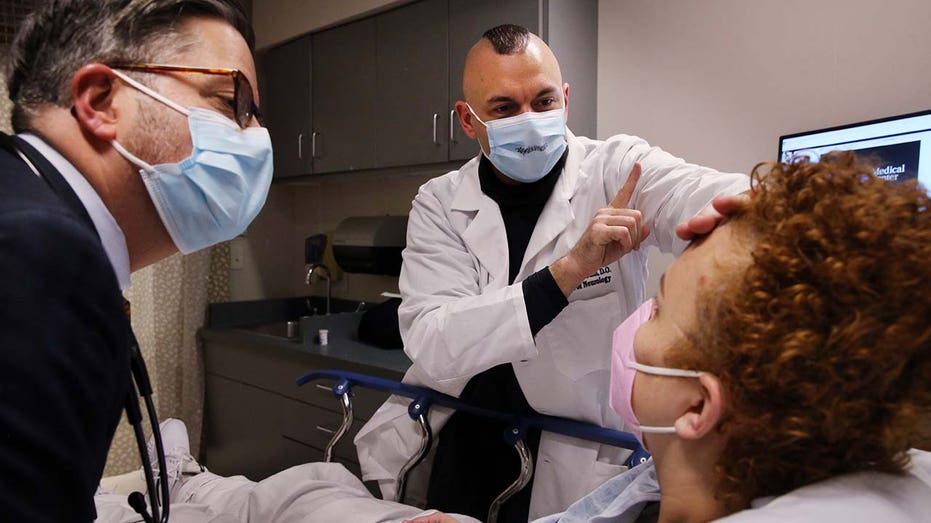AI has already surpassed human capabilities in several domains; which jobs are next?
Expert says industries must prepare themselves for rapidly-developing AI technology
Which industries are most at risk because of artificial intelligence?
Zeta Global [NYSE: ZETA] CEO David Steinberg gives his take on AI taking human jobs on ‘Making Money.’
It's been less than a year since generative artificial intelligence (GenAI) tools like OpenAI's ChatGPT became available to the public, and the technology has already shown remarkable advancements. In several areas, it has even surpassed human capabilities.
One expert says that while the benefits of AI are exciting, industries and society at large must prepare for the disruptions that are coming.
Psychologist and AI expert Banu Kellner is a longtime executive coach based in San Francisco.
She notes that in the short time since GenAI tools were unleashed, AI already performs as well as the average programmer and has passed the bar exam. And she pointed to a study from the spring showing patients prefer a chatbot's bedside manner over conventional doctors.
WHAT IS ARTIFICIAL INTELLIGENCE (AI)?

A study from earlier this year found patients preferred an AI chatbot's bedside manner by nearly 80% over a conventional doctor's. (Craig F. Walker/The Boston Globe via Getty Images / Getty Images)
It's not just white-collar jobs involving data collection and analysis that are at risk. Creatives are also vulnerable. AI can create a headshot now, so customers don't need to hire a photographer. It can create music, write a film script and even plan your vacation.
ENTERTAINMENT COMPANIES HIRING AI SPECIALISTS AMID HOLLYWOOD STRIKE
Kellner says architecture firms must be ready for AI entering their space because it already has. Same for engineers and financial advisers. Reporters and copy editors are already on alert.
She says the only jobs that are safe in the short term are professions requiring a human touch that cannot be delegated to AI – at least until humanoid robots take over.
But Kellner also points to enormous opportunities that come with AI and hopes it will fuel entrepreneurship, especially small businesses.

AI could inspire entrepreneurship, according to Silicon Valley-based AI expert and executive coach Banu Kellner. (iStock / iStock)
"It may be easier to create businesses because an AI is going to tell you what we need to do step by step and even do it for you," she told FOX Business. "You can be a one-person shop if you just have a good idea and create a product and figure it out without having a team or the knowledge base."
Kellner wrote "The SuperHumanist Manifesto" about the relationship of AI and other new technologies and how to use them for the future of humanity. She stressed it is important for executives to become familiar with new AI tools and figure out synergy between AI and employees for workers to be up-skilled and re-skilled.
She also says business leaders and individuals need to prepare themselves for the rapid change AI is bringing.
"I talk to people outside of tech, and they haven't even played with ChatGPT. They don't really understand what's going on. They are not ready for what's coming," Kellner said. "I think people are not prepared, and it's going to happen really fast.

Executive coach Banu Kellner warns business leaders and society at large of a need to prepare workers for the coming transformation and disruption of jobs by AI. (iStock / iStock)
"We have to prepare the public," she added. "People will be afraid for their jobs, and some people are going to be already affected. Anxiety levels are already high in our country. So, I'm worried about the mental health consequences of this very drastic change that will affect people's lives."
Kellner further stressed the importance of understanding both the risks and potential benefits of AI and to direct how humans use and steer the technology in an intentional way.
GET FOX BUSINESS ON THE GO BY CLICKING HERE
"The future is unpredictable even by the people who created these technologies. … I'm very involved in all the AI researchers, ethics and people working on policy, and one thing I can tell you is we all make predictions, but we don't know exactly how things are going to play out," she said.
"But the way I see it, if you have a positive vision, we can use the information we have at that point, and we can make decisions as they're happening. Because even in two years, even the people creating these technologies don't know where it is going to be in terms of the capabilities."





















![Zeta Global [NYSE: ZETA] CEO David Steinberg gives his take on AI taking human jobs on ‘Making Money.’](https://cf-images.us-east-1.prod.boltdns.net/v1/static/854081161001/eca6cb1e-298c-4c91-8e3a-53277594fd5c/c3ff455f-155b-4271-abf1-b51c7360fff8/1280x720/match/image.jpg)